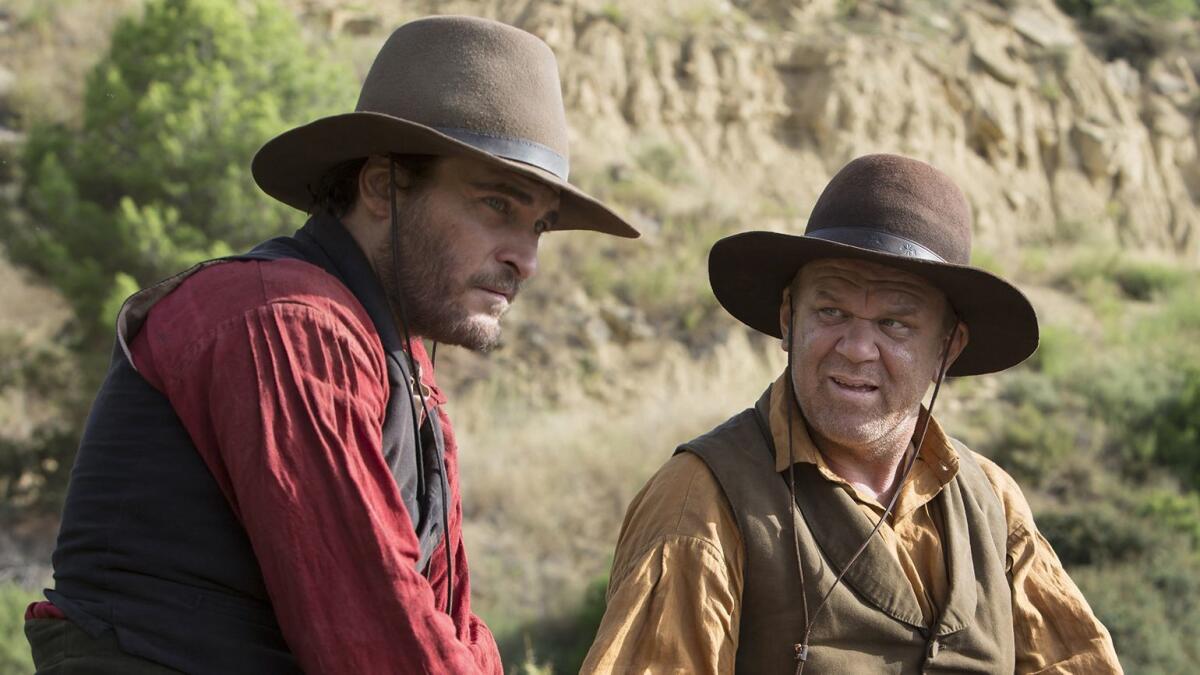Glenn Close, John C. Reilly and other stars on what happens to their characters after the movie ends
- Share via
When the credits roll, a movie’s story is over — or is it? That could depend on what chair you’re in. As a first-time director (of the family drama “Wildlife”), Paul Dano says he hasn’t thought about what comes after the credits in his picture. “The final image is the ending. That’s the film for me. It’s a moment of grace.” But when he shifts into the actor’s chair and recalls playing Brian Wilson in “Love & Mercy,” it’s a different story. “You spend so much time preparing for a role and doing it, it doesn’t just disappear,” he says. That’s the case for other actors, who often spend time building their character’s backstory, figuring out their life before the events of the film take place. So why not create an “after-story” as well? The Envelope spoke with some performers who did just that. Oh, and we’re talking about film endings here. If you haven’t seen “Widows,” “Leave No Trace,” “The Sisters Brothers” or “The Wife,” and don’t want to know how they end, turn the page now.
Elizabeth Debicki (Alice), “Widows”
Where we left off: Having been successful at a heist set into motion by their criminal husbands and boyfriends’ deadly last job, the titular widows (including Alice) come into a great deal of money.
What (could) come next: How the ladies spend the cash gets some screen time before the credits finish, but Debicki has taken it further. “I like to think that she would get an education now. She could enroll in something in Chicago, and she would want to very much be single. When she goes shopping, she’ll be a Bloomingdale’s girl.”
Making projections: “Sometimes you can say, ‘I’m going to leave that role on the floor,’” says Debicki. “But with Alice, I was very close to her. I didn’t want to leave. I wanted to keep playing inside that world and be close to her. So you do start to think about what these women will be like with a golden ticket like that.”
FULL COVERAGE: Get the latest on awards season from The Envelope »
Ben Foster (Will), “Leave No Trace”
Where we left off: Will’s daughter, Tom, decides she wants a different lifestyle than living off the grid with her father, as she’s done for many years, and they go their separate ways.
What (could) come next: “I think that Will was hoping in his heart that they would make their own version of life in a natural setting,” says Foster. “And when she decides that she no longer wants to live this way, he has to confront the future without her. He’s constantly battling with beginnings and endings, because of his PTSD. He’ll keep moving.”
Making projections: Imagining what happens later to a character can be tricky, says Foster. “Sometimes it does help with the thrust and direction, so you know how to sail the boat,” he says. “But I don’t always like knowing what other people are doing, necessarily. My dad and I were watching ‘McCabe and Mrs. Miller’ when I was young, and he’s been shot and it was very stressful. My dad said, ‘He’s just resting.’ And I liked that, like it was the character’s choice.”
John C. Reilly (Eli Sisters), “The Sisters Brothers”

Where we left off: Assassins-for-hire Eli Sisters and his brother, Charlie, have at least temporarily escaped the law and are resting up at their mother’s home.
What (could) come next: “I hope no one figures out that they went to their mother’s house, first of all,” says Reilly. “They have a long trail of bodies behind them and there’s a good chance someone will catch up with them. I like to think they became farmers, or run a little store. That was Eli’s dream.”
Making projections: Reilly confesses that he didn’t put a lot of thought into what happened next over the seven years it took to produce the film with his wife, Alison Dickey. “You do connect with characters, but it’s not healthy to hang on too much. Being an actor is like being a vessel — it affects you while you’re doing it, but I’m usually relieved when it comes time to set a character down.”
Glenn Close (Joan Castleman), “The Wife”
Where we left off: Joan’s husband, Joe, who had been fueling his literary career (ultimately winning the Nobel Prize) by using his name on her books, dies moments after she says she’s leaving him.
What (could) come next: “I think she’s telling the truth when she tells her son that when they get home, she’ll tell him and his sister the truth [about their father’s lack of literary gifts),” says Close. “She has to keep writing. Would she give back the Nobel Prize? My latest theory is that yes, she gives it back. It would be the right thing to do.”
Making projections: “Well, I’ve died in a lot of roles,” says Close, which may be why she doesn’t often speculate as to where her characters go next. “It’s nice to play a character that can elicit that kind of [imagination] — to make people wonder what happened next. With some characters I’ve played, like [‘Damages’’] Patty Hewes, you could write whole scripts about what happened to the next stage.”
More to Read
Sign up for The Envelope
Get exclusive awards season news, in-depth interviews and columnist Glenn Whipp’s must-read analysis straight to your inbox.
You may occasionally receive promotional content from the Los Angeles Times.









